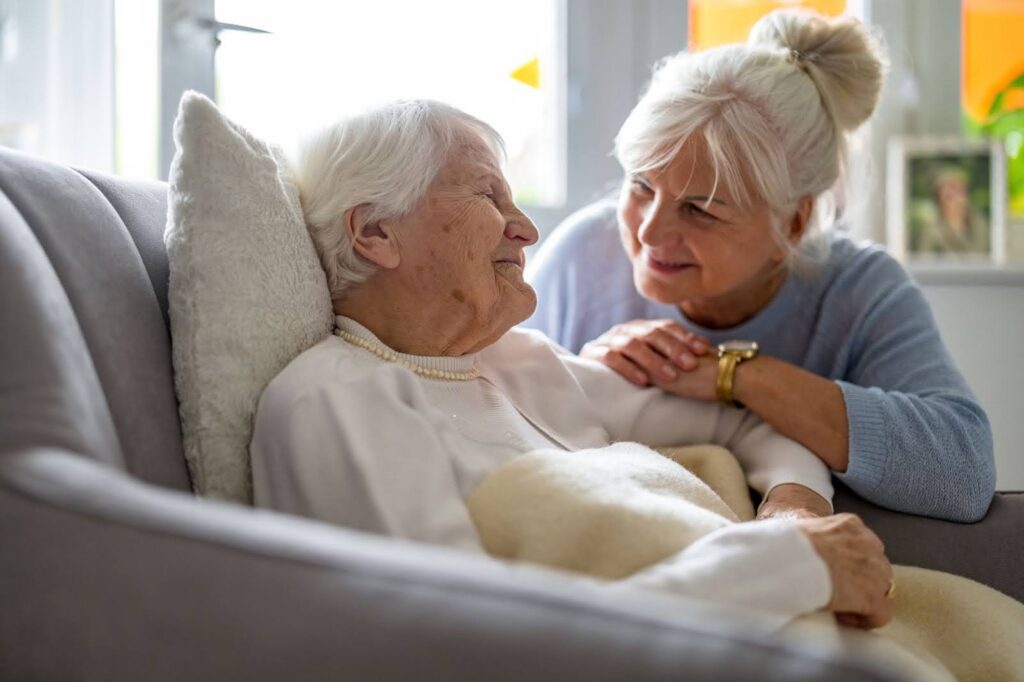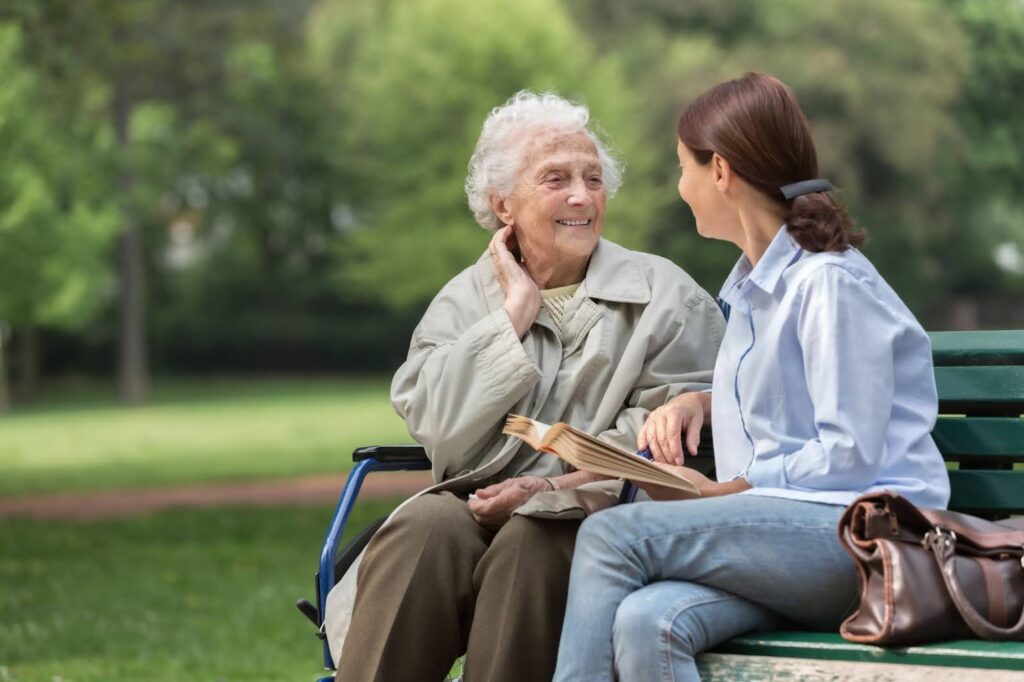Overcoming Caregiver Guilt: Why Seeking Support Is an Act of Love
Date: April 21, 2025 | Article | Reading Time: 6 minutes
Overcoming Caregiver Guilt: Why Seeking Support Is an Act of Love
Caring for a loved one is one of the most selfless acts, but it often comes with emotional challenges – especially caregiver guilt. Many family caregivers struggle with feelings of inadequacy, worry, and stress, even when they are doing their best.
The reality is that caregiving can be overwhelming, and guilt often arises when caregivers feel they aren’t doing enough, need a break or decide to move their loved ones into senior living. However, seeking support isn’t a sign of failure – it’s an act of love.
At The Delaney® at The Vale, we understand the challenges caregivers face and provide a supportive, enriching environment where seniors can thrive, giving families peace of mind.
What Causes Caregiver Guilt?
Many caregivers experience guilt for a variety of reasons. While caregiving is an act of love, it can also bring feelings of self-doubt and emotional strain. Recognizing the following common causes of caregiver guilt can help in taking steps toward a healthier mindset.
- Feelings of obligation – Many caregivers believe they are the only ones who can provide the best care for their loved ones. This sense of responsibility can make it difficult to accept help or consider alternative care options.
- Not visiting enough – Caregivers who have transitioned their loved ones to a senior living community may feel guilty for not being present as often as they would like. Busy schedules, personal responsibilities, and distance can contribute to this worry.
- Making the decision for senior living – Moving a loved one into a senior living community can be one of the toughest decisions a caregiver makes. Even when they know it is in their loved one’s best interest, they may struggle with feelings of guilt, wondering if they made the right choice.
- Personal stress and burnout – Caregiving can be physically and emotionally exhausting. However, many caregivers feel guilty for prioritizing their own well-being, even though self-care is essential to providing quality care in the long run.
- Feeling trapped – The ongoing demands of caregiving can feel overwhelming, leading to stress, resentment, and even isolation. Many caregivers feel torn between their caregiving responsibilities and other aspects of their lives, leading to guilt when they need to step back.
While these feelings are common, it’s important for caregivers to recognize that seeking support is not a failure – it’s an essential step in maintaining both their well-being and the quality of care their loved ones receive.
How Caregiver Guilt Can Worsen Health
Unaddressed caregiver guilt and the stress that accompanies it can have significant adverse effects on caregivers’ overall health and well-being. When caregivers push their own needs aside in an attempt to meet the demands of caregiving, it can lead to a cascade of physical, emotional, and relational issues that can make it harder to continue providing the best care for their loved ones.
- Increased stress levels – Constant worry and pressure to do everything perfectly can lead to emotional and physical exhaustion, causing issues like chronic headaches, sleep disturbances, and an increased risk of heart disease.
- Neglecting self-care – Sacrificing personal needs like sleep, exercise, and mental breaks can result in burnout and weakened immunity, making it harder to provide quality care and maintain overall health.
- Impact on relationships – Caregiver stress can strain relationships, causing irritability, emotional withdrawal, and isolation, which worsens emotional well-being.
- Mental health concerns – The guilt and emotional burden of caregiving can lead to anxiety, depression, and burnout, making it difficult to maintain a positive outlook and care for a loved one effectively.
When caregivers neglect their own well-being, it can have a detrimental impact not just on their own health but also on their ability to provide effective and compassionate care. It is essential that caregivers prioritize self-care, seek support, and recognize that caring for themselves is just as important as caring for others.

Dealing With Caregiver Guilt: Healthy Coping Strategies
Caring for a loved one can be incredibly rewarding, but it often comes with feelings of guilt and emotional overwhelm. Coping with these feelings takes a mix of self-kindness, support from others, and simple strategies that can make a big difference. Here are some healthy ways to help manage caregiver guilt:
- Acknowledge your feelings – It’s important to accept that feeling guilty is natural, but it doesn’t need to control your decisions. Recognizing that guilt is a common experience for many caregivers allows you to address it with compassion rather than judgment.
- Prioritize self-care – Taking care of your physical and emotional well-being is essential. Regular sleep, exercise, and mental breaks not only help you recharge but also improve your ability to provide effective and compassionate care. Remember, self-care isn’t selfish; it’s necessary for long-term caregiving.
- Seek support – Reaching out to family members and friends, or joining caregiver support groups can provide invaluable emotional support and reassurance. Talking to others who understand your experience helps normalize feelings of guilt and stress, and can offer fresh perspectives and practical advice.
- Redefine your role – Instead of seeing yourself as a full-time caregiver, view your role as a loving advocate for your loved one’s well-being. This shift in perspective helps reduce feelings of being trapped and empowers you to make decisions that prioritize both your needs and those of your loved one.
- Trust professional care – Sometimes the best way to care for someone is by entrusting them to professional care. Senior living communities, like The Delaney at The Vale, offer expert care that ensures safety, promotes social engagement, and enhances overall quality of life. This allows you to feel confident that your loved one is receiving the support they need while relieving you of the constant pressure.
By shifting their perspectives and embracing these strategies, caregivers can release unnecessary guilt and move toward a healthier, more sustainable approach to caregiving that fosters both well-being and peace of mind.
How The Delaney at The Vale Supports Seniors and Caregivers
At The Delaney at The Vale, we provide:
- Personalized care plans – Ensuring each resident receives the right level of support
- A vibrant community – Social activities, wellness programs, and enriching experiences that promote well-being
- Respite and transitional care – Offering caregivers the opportunity to take a break, knowing their loved ones are in good hands
- Compassionate staff – Dedicated professionals committed to residents’ health and happiness
- Peace of mind for families – Knowing that their loved ones are receiving high-quality, expert care in a supportive environment
Our goal is to support both seniors and their family members, providing a place where everyone can feel confident in their choices.

Find Support and Compassion at The Delaney at The Vale
Seeking help isn’t a sign of failure –it’s an act of love. Caregivers deserve support just as much as their loved ones, and finding the right balance can lead to a healthier, more fulfilling experience for everyone involved.At The Delaney at The Vale, we’re here to provide compassionate care and peace of mind. If caregiver guilt is weighing on you, let us help. Contact us today to learn more or schedule a tour.
